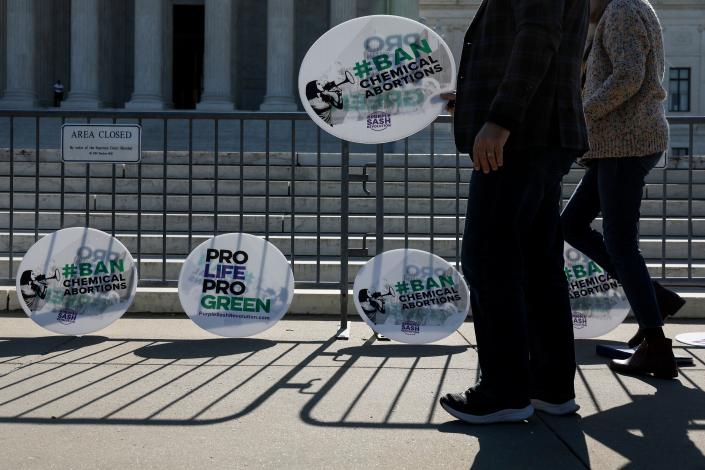WASHINGTON − The Supreme Court put the legal battle over the abortion pill mifepristone on pause Friday, granting Americans full access to the medication while a challenge to the Food and Drug Administration’s approval of the drug continues.
While the decision was a rare win on the high court for abortion rights, it’s unlikely to be the final say on the drug – and doesn’t offer any insight into the potential outcome of a litany of other reproductive rights cases now percolating in lower federal courts.
When the Supreme Court overturned Roe v. Wade last summer, some people hoped the divisive decision would get federal courts out of the business of having to rule on abortion. The battle over mifepristone has underscored that it hasn’t quite worked out that way.
News: Supreme Court halts mail, telehealth restrictions on mifepristone
FDA: Mifepristone court battle could threaten access to other FDA-approved drugs
Here’s a look at the latest decision from the high court and what may come next.
What the Supreme Court said on mifepristone and what comes next
The Supreme Court shot down, for now, restrictions imposed by lower courts on the abortion pill drug mifepristone. Though the court was not ruling on the merits, its unsigned, one-paragraph order maintained the status quo on access to the drug.
The case now returns to the U.S. Court of Appeals for the 5th Circuit, which is reviewing U.S. District Judge Matthew Kacsmaryk’s decision earlier this month that, in effect, invalidated the FDA’s approval of the drug.
While the Supreme Court’s order was a win for abortion rights groups, it did not reach the merits of the case, which could return to the high court in a matter of months.
‘Return the issue…to the people’
When the Supreme Court handed down its decision last year in Dobbs v. Jackson Women’s Health Organization, a central theme of the majority’s opinion was the notion of returning abortion to elected representatives in states.
Story continues
“It is time to heed the Constitution and return the issue of abortion to the people’s elected representatives,” Justice Samuel Alito wrote for the majority. “This court cannot bring about the permanent resolution of a rancorous national controversy simply by dictating a settlement and telling the people to move on.”
Judge: Who is Judge Kacsmaryk and why was the abortion pill case in his court?
Ignore courts? Some float defiance on abortion pill. Experts say it’s an explosive idea.
In some ways, that has happened. At least 14 states, including Texas, Arkansas and Kentucky, have completely or almost completely banned abortion, actions that led to a dizzying series of lawsuits in state courts. Other states, including New York and California, have sought to further protect people’s access to the procedure. The result is what many experts predicted: A patchwork of different abortion laws across the country.
But that hasn’t wiped abortion off federal court dockets. The Dobbs decision last year has raised many new questions and led to new litigation, including the fight over mifepristone access. Many of those cases may work their way up to the Supreme Court in coming months or years − keeping reproductive rights front in center for the justices.

One question likely to be sorted out by federal courts: What happens if a resident in a state with strict rules decides to have an abortion − or purchase abortion drugs − in a state with more lenient rules? Can the more conservative states regulate that decision or criminalize it?
A federal judge in Idaho is set to hold a hearing Monday about whether that state’s abortion ban bars doctors from referring people to out of state clinics for abortion care.
Separately, Idaho Gov. Brad Little, a Republican, signed into law this month a bill that would make it a crime to help a pregnant minor get an out-of-state abortion without parental consent. The first of its kind in the U.S., the law creates a new crime of “abortion trafficking,” and carries a sentence of two to five years in prison.
Justice Brett Kavanaugh laid down a marker on the issue in Dobbs last year, asserting that – generally – travel prohibitions would not be permitted “based on the constitutional right to interstate travel.” Kavanaugh’s vote would be critical if that issue made its way to the high court, but it’s not clear how he would view the specifics of a particular case.
Safe: Mifepristone ‘safer than Tylenol,’ experts say amid battle over major abortion pill
Travel: How a case about pig farms could muddy debate over out-of-state abortions
Texas officials, in another matter, are suing the Biden administration over guidance issued in July that warns pharmacies they may be violating anti-discrimination law if they declined to fill prescriptions for drugs that can induce an abortion.
What are people saying about the high court’s abortion pill decision?
Abortion rights groups applauded the decision Friday, but also sounded a note of caution for their side of the debate.
“We cannot overstate how crucial it is that people still have access to this safe, effective medicine,” said NARAL Pro-Choice America President Mini Timmaraju. “The fight, however, is far from over.” Anti-abortion “extremists,” she said, would continue to “use the courts to push their deeply unpopular agenda.”
Alliance Defending Freedom, which filed the lawsuit against the FDA, described the order as procedural and said it is looking forward to the case continuing.
“As is common practice, the Supreme Court has decided to maintain the status quo that existed prior to our lawsuit while our challenge to the FDA’s illegal approval of chemical abortion drugs and its removal of critical safeguards for those drugs moves forward,” the group’s senior counsel, Erik Baptist, said in a statement. “We look forward to a final outcome in this case that will hold the FDA accountable.”
Contributing: Christine Fernando
This article originally appeared on USA TODAY: Abortion: Mifepristone fight will continue after Supreme Court ruling